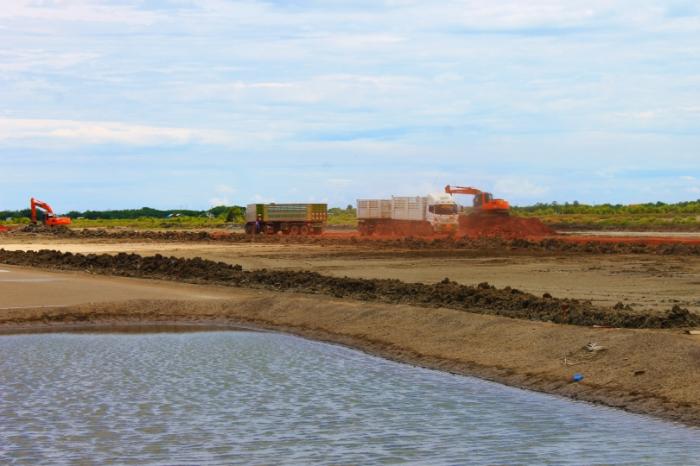Farmers choose solar farm over our endangered spoon-billed sandpipers

SAMUT SAKHON: Given a choice between renewable energy and wildlife conservation, the people of Samut Sakhon have opted for a solar farm.
Tractors and trucks loaded with soil were seen busily working in a field yesterday to fill a salt basin in Ban Khok Kham, where a three-megawatt solar farm project, costing about 180 million baht, is set to start pumping out power in December.
Conservationists have protested that the site chosen for the solar farm is an important wetland, and that its destruction would threaten the very existence of the endangered spoon-billed sandpiper.
The owner of the 42 rai, Wai Rodtayoi, said farmers like him are not worried about the impact on the birds because leasing the land to the solar farm operator is more profitable than conservation.
“We don’t get anything from the birds. They just come here to catch fish and we don’t earn anything from that,” Mr Wai said. “We cannot hunt them because it is against the law and they also eat the fish from our ponds. We prefer the solar farm over the birds because we will receive a substantial amount of cash from it.”
According to Sunseap Energy Co Ltd, the land owner will receive over 1 million baht (approx US$ 28,000) per year for the 25-year lease.
Mr Wai said that the traditional occupation of producing salt in the area was no longer sustainable as the price of salt is now only about 1,000 baht per 1.5 tonnes.
“We are all too old to continue panning for salt and the new generation is not interested in that work either,” Mr Wai said. “I think it would be better to use this land for producing solar power because it is clean, instead of us selling the land for farming or for building factories, as that would cause more ecological damage,” he said.
However, prominent bird watcher and Mahidol University lecturer Philip Round said the salt basin in Ban Khok Kham is an essential wetland for migratory birds, and one of the last two habitats in the Bay of Bangkok area for the critically endangered spoon-billed sandpiper.
“This basin is a critical area for the birds,” Mr Round said. “It is one of only two areas in Thailand that are declared as a reserve site for shore birds under the East Asian-Australian Flyway Partnership, of which the Thai government is also a signatory.”
“The Ban Khok Kham salt basin is a very crucial area for bird conservation. It welcomes up to 500,000 migrating birds per year. There are around 50 species of shore birds here and 12 of them are endangered, including the nearly extinct spoon-billed sandpiper.”
Mr Round said he was against the construction of any structure in the area because “we do not know what the impact of the development on the bird population will be, and if the solar farm is built there, then it may result in an irreversible loss of this rare bird habitat.”
“People often say that birds have wings and can fly to other places, but in this case they will have nowhere to go. This is a habitat loss and it will further reduce biodiversity and a chance for survival of many other bird species.”
Thathaya Pittayapa of the Bird Conservation Society of Thailand (BCST) says the 200 rai of salt basin in Samut Sakhon is going to disappear because there is no law to conserve bird populations on private land.
— The Nation
Latest Thailand News
Follow The Thaiger on Google News:


























